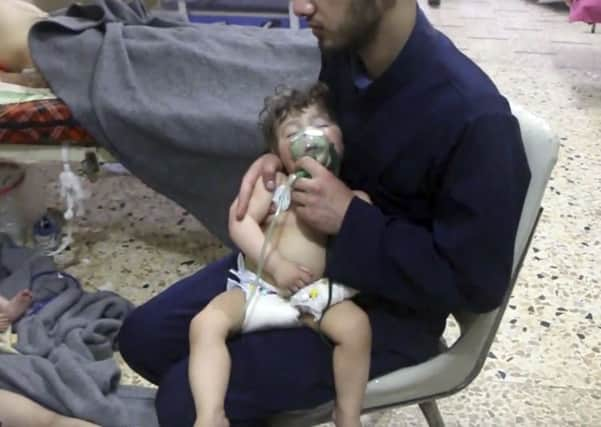Chris Bond: From Arab Spring hopes to the tragic ruin of Syria


It was a different story back in 2011. In January that year, the Tunisian government was overthrown following a popular uprising. Then, following 18 days of mass protests, Egypt’s deeply divisive president Hosni Mubarak was forced to resign after three decades in power.
There was a feeling that this was a new dawn, not only for these two countries but the whole of the Middle East. And then came Syria.
Advertisement
Hide AdAdvertisement
Hide AdHere the government sought to quell the demonstrations with force, sparking a bitter civil war that has raged ever since.
The fighting has lasted longer than both world wars and places like Homs and Aleppo – Syria’s once thriving second city and a Unesco World Heritage site – have been reduced to rubble.
Seven years into this unforgiving conflict and the living conditions of civilians inside Syria are worse than ever.
The UN says at least 250,000 people have been killed, but it stopped keeping count back in August 2015. The Syrian Observatory for Human Rights reported in December that it had documented the deaths of more than 346,600 people – but this figure doesn’t include the 56,000 people who are missing, presumed dead.
Advertisement
Hide AdAdvertisement
Hide AdIt’s estimated that around 5.6m people – mostly women and children – have fled Syria since the fighting erupted, with the vast majority ending up in neighbouring Lebanon, Jordan and Turkey, all of which have struggled to cope with this desperate sea of humanity.
At crucial junctures during this time Europe and the United States have dithered, and their failure to formulate a clear strategy over Syria created a power vacuum that enabled Islamic militants, and IS in particular, to incubate.
This presented Vladimir Putin with an opportunity to seize the initiative and prop up President Assad’s morally bankrupt regime.
In a conflict characterised by the sheer depths of its inhumanity, last weekend brought yet another low point with reports that more than 40 people, including women and children, were killed in a suspected chemical attack on Douma, the last rebel-held town in the Eastern Ghouta region, near the capital Damascus.
Advertisement
Hide AdAdvertisement
Hide AdThe Syrian government and its Russian allies claim the attack was fabricated. However, the shocking TV footage coming out of the country suggests differently and the US, along with Britain and France, are now considering military action.
Last year President Trump ordered missile strikes against an airfield in Syria following a nerve agent attack on a rebel-held town. It was supposed to act as a deterrent against future chemical attacks but failed to have the desired effect.
The difficulty facing the West now is that any action it takes is fraught with danger. Syria has the backing of Russia and Iran, and both have invested a great deal in ensuring that Assad rides out this storm whatever the cost.
Saudi Arabia and Israel want the US, in particular, to play a more forceful role, but in a region now armed to the teeth, and which contains so many complex alliances, any intervention is likely to escalate what is already a powder keg waiting to blow.
Advertisement
Hide AdAdvertisement
Hide AdNot only that, but if the wars in Iraq and Afghanistan taught us anything, it’s that air strikes are only effective in support of troops on the ground, and there is little or no chance of that happening. Not even Donald Trump is that reckless. This latest conflagration has also proven just how toothless the UN’s Security Council is, with Russia once again using its power of veto to put the kibosh on any attempt to apportion blame for this latest atrocity.
It’s like groundhog day, with the UN capable of expressing plenty of outrage and indignation but utterly powerless to stop the bloodshed.
As always, it’s ordinary people who suffer. What makes the situation even more tragic is that unlike most other countries trapped in a bitter civil war, Syria wasn’t a poor country. A decade ago, this was a culturally-rich and socially vibrant place and now this has turned to dust.
The scale of the atrocities and the level of hatred between the regime and its supporters and those who oppose them has become so venomous it is hard to envisage a peaceful resolution.
Advertisement
Hide AdAdvertisement
Hide AdTo the outside world there appears to be no end game beyond annihilation.
Spring may finally be here, but it means nothing to those living in the ruins of this once beautiful country.
In his Easter message earlier this month, Pope Francis called for an end to what he called the “carnage” in Syria. The reality is it will take more than well meaning words, or divine intervention, to bring an end to this 21st century horror.
The conflict has been a catastrophic failure of diplomacy, leadership and humanity, and of one man in particular. For whatever the future holds for this traumatised country there can be no peace, or justice, until Bashar al-Assad stands trial for the wanton, and entirely avoidable, destruction that has occurred on his watch. The question now is how his removal can be brought about without inflaming the civil war still further.